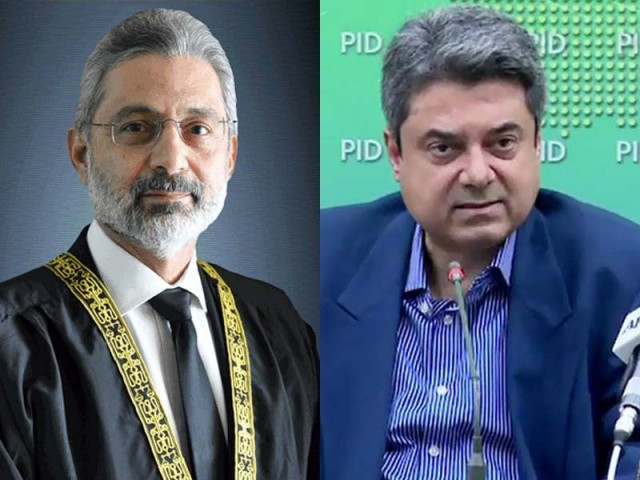SC asks why Justice Isa must disclose family property
Federal counsel claims FBR officials were too afraid to proceed against judge under tax law

Justice Qazi Faez Isa (left) and former law minister Farogh Naseem. PHOTO: FILE
Justice Isa’s petition against the reference and the proceedings of the Supreme Judicial Council against him were heard before a 10-judge full bench of the Supreme Court.
In response to federal government counsel Dr Farogh Naseem’s argument that Justice Isa had not provided the money trail for the properties of his family, Justice Bandial observed that there was no allegation of corruption or that the petitioner judge had obtained money through illegal means.
He noted that undeclared foreign property came under the purview of the tax law, and asked Dr Naseem to explain the legal reasons on the basis of which Justice Isa was bound to disclose his family properties. Justice Bandial asked whether the accused Supreme Court judge had committed any misconduct.
He further said that the reference could not be filed on tax violation and the case came under the purview of Article 209 of the Constitution of Pakistan – which pertains to action against a judge when he has been guilty of misconduct.
He said that action is initiated under Article 209 when the judiciary as an institution is injured and there is serious element of dishonesty or corruption in his work which affects public trust in the judiciary. He further said the Constitution gave protection to judges as well.
Justice Bandial said that money laundering is linked with criminal action and observed that Justice Isa had declared income enough to purchase these properties in 2008-2009.
The federal government lawyer maintained that proceedings were initiated against a judge in India when the properties of his family members were not declared.
However, Justice Bandial asked Dr Naseem to point towards Pakistani law which puts a legal obligation on the accused judge to disclose properties of his family.
On being questioned on proceedings under the tax law, the federal counsel maintained that officials of the Federal Board of Revenue (FBR) were scared to proceed against Justice Isa’s family members. He stated before the court that FBR officials refused to act and offered their resignation.
Upon this, Justice Maqbool Baqar wondered under what law the federal government itself had started action against the judge after the refusal of FBR officials.
Justice Baqar inquired what triggered the federal government to file the reference against Justice Isa.
He observed that there was a chain of events before filing of the reference. Likewise, he said, there was a perception that certain quarters were unhappy with one of the verdicts authored by Justice Isa. Later, review petitions were filed against the ruling of Justice Isa and questions of misconduct were raised.
The SC judge asked whether the Assets Recovery Unit (ARU) had checked the credentials of the journalist, Abdul Hameed Dogar, who had first given the information on these properties of the apex court judge’s family.
“Have you asked who gave him this information and what his background was,” asked Justice Baqar. Many things happen through the divine in this country, he observed.
Dr Naseem replied that Dogar had refused to disclose his source by saying that the source was his asset.
Meanwhile, Justice Mansoor Ali Shah of the SC questioned Dr Naseem’s argument that Justice Isa had revealed everything except the source of funds to purchase these flats and how those funds were transferred to the United Kingdom. Justice Shah asked why Justice Isa should have to reveal the money trail. Tell us which law binds him to reveal the source of these funds, he asked.
Justice Shah said that the petitioner was maintaining that his family members were independent and they should be approached about the source of funds.
He further asked the federal counsel to furnish details of complaints of individuals which are received by the ARU against public office holders and the actions which are initiated against such.
The federal lawyer read out the Supreme Judicial Counsel’s show-cause notice stating that Justice Isa had filed the reply over the notice and, therefore, his petition against the reference was not maintainable. He also stated that the SC judge is hiding behind facade of independence of judiciary. Naseem stated that when these properties were purchased, the SC judge’s children were too young. Likewise, the tax record shows that his wife’s income was not enough to purchase these flats.
In the end, Justice Bandial asked Naseem to respond to these queries:
1) A violation of trivial requirements of the tax law may not necessarily be misconduct in terms of Article 209. There is no allegation of corruption nor have any ingredients of money laundering been shown. So the government must show that the judge violated some legal obligation serious enough to justify Article 209.
2) The government should show some law, whether in income tax or otherwise, that imposes upon a judge the legal duty to disclose his wife & children’s assets even if they are not dependent. Or which makes a judge responsible to show a money trail for their assets due to some kind of doctrine of “sufficient connection”. But this doctrine or obligation must be established in some law and can’t just be assumed.
3) Even if assumed that the presidential reference had some defects in its procedure, wasn’t it still open for the SJC to say that well we don’t accept the reference and we file it but the material that has been brought forward is still serious enough to justify an independent suo motu enquiry of our own?
The court adjourned the hearing till Thursday.
The federal government may face dreadful consequences in the Justice Qazi Faez Isa case.
Despite being asked several times, the federal government has yet to respond to the judges about their concerns regarding legal status of ARU and question malafide.
A senior lawyer, who witnessed full court proceedings over the last two days, believes that the federal government is struggling in this case. If the apex court quashes the reference on the basis of malafide in law and facts, then responsibility might be fixed against government functionaries.



















COMMENTS
Comments are moderated and generally will be posted if they are on-topic and not abusive.
For more information, please see our Comments FAQ